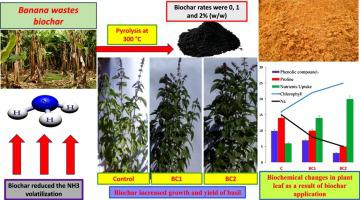Industrial Crops and Products ( IF 5.9 ) Pub Date : 2020-09-02 , DOI: 10.1016/j.indcrop.2020.112903 Zheli Ding , Zhaoxi Zhou , Xinge Lin , Fengliang Zhao , Bizun Wang , Fei Lin , Yu Ge , Mamdouh A. Eissa

|
Sweet basil (Ocimum basilicum var. Genovese) is an important medicinal herb and is considered to be a moderately salt-tolerant plant. However, little is known about the effect of biochar on enhancing its salinity tolerance. The response of basil plant to water salinity (8 dS m−1, NaCl salinity) and three levels of biochar i. e., C, BC1, and BC2 (0, 1, and 2 % by weight) was investigated, as was the effect of biochar on NH3 volatilization kinetics. Irrigation of basil plants with saline water reduced the plant height, fresh weight, and dry weight by 27 %, 18 %, and 17 % in comparison to tap water. The application of biochar to saline irrigated basil caused remarkable increases in all the recorded growth parameters. Water salinity reduced N, P, and K availability and shoot concentrations. When applied, BC1 and BC2 under saline conditions increased shoot concentrations of N by 42 % and 67 %; P by 40 % and 70 % and K by 15 % and 50 %. Water salinity increased the concentrations of proline and phenolic compounds by 15 and 70 %, respectively; moreover, it reduced the total chlorophyll by 10 %. Water salinity reduced the oil yield by 15 %. The overall oil yield was increased by 18 and 38 % as a result of BC1 and BC2 application. The salinity of irrigation water increased the NH3 volatilization and reduced its half-life by 34 %. On the other hand, biochar reduced NH3 volatilization and increased its half-life. Biochar improved the growth and yield of basil plants by improving the efficiency of photosynthesis and the absorption of essential nutrients. It also had a role in reducing the concentrations of biochemical substances produced under salt stress. Therefore, using biochar is a good strategy for reducing NH3 volatilization and enhancing soil quality and plant productivity under saline irrigation.
中文翻译:

盐分条件下生物炭对甜罗勒(Ocimum basilicum L.)NH 3挥发动力学和生长的影响
甜罗勒(Ocimum basilicum var。Genovese)是重要的药用植物,被认为是中等耐盐的植物。然而,关于生物炭增强其耐盐性的作用知之甚少。研究了罗勒植物对水盐度(8 dS m -1,NaCl盐度)和三种生物炭水平(即C,BC 1和BC 2(0、1、2重量%))的响应。生物炭对NH 3的影响挥发动力学。与自来水相比,用盐水灌溉罗勒植物可将株高,鲜重和干重降低27%,18%和17%。生物炭在盐水灌溉罗勒上的应用导致所有记录的生长参数显着增加。水盐度降低了氮,磷和钾的利用率以及芽的浓度。当施用时,在盐水条件下,BC 1和BC 2使N的苗芽浓度分别增加42%和67%。P为40%和70%,K为15%和50%。水盐度分别使脯氨酸和酚类化合物的浓度增加了15%和70%。此外,它使总叶绿素减少了10%。水盐度使油产率降低了15%。由于卑诗省,整体石油产量分别增加了18%和38%1和BC 2应用程序。灌溉水的盐度增加了NH 3的挥发,并使半衰期缩短了34%。另一方面,生物炭减少了NH 3的挥发并增加了其半衰期。生物炭通过提高光合作用效率和吸收必需养分来改善罗勒植物的生长和产量。它还具有降低盐胁迫下产生的生化物质浓度的作用。因此,使用生物炭是减少NH 3挥发并提高盐分灌溉条件下土壤质量和植物生产力的良好策略。


























 京公网安备 11010802027423号
京公网安备 11010802027423号